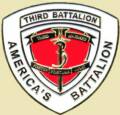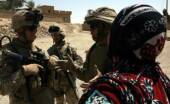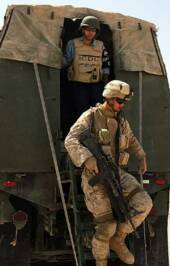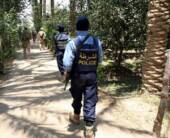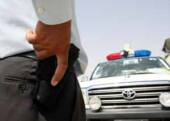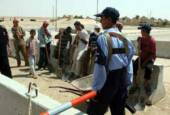Sunday, August 20, 2006
'Rules' of war limit Marines
GORDON DILLOW
OC Register columnist
(Note: this article added for perspective only)
We call it "the war in Iraq." But to many of the Marines here, it's not really a war - at least not on their side.
"They are fighting a war," a Marine from 3rd Battalion, 3rd Marine Regiment tells me - "they" meaning the insurgents lurking "outside the wire" of a Marine forward operating base in the Euphrates River town of Barwanah, in western Al Anbar province.
"But us?" the Marine goes on. "We aren't fighting a war. We're just doing a police action."
The young Marine is right. While the insurgents here and throughout Iraq battle American Marines and soldiers with deadly weapons of warfare - IEDs ("improvised explosive devices," or roadside bombs), sniper attacks, mortars, two of which exploded near this forward operating base just the day before - the Marines have to respond under "rules of engagement," or "ROEs," that would be familiar to any cop in America.
Are the Marines catching sniper rounds from a cluster of buildings in the city? In a conventional war, that would be reason enough to light up the buildings with suppressive fire.
But under the Iraq ROEs, unless the Marines get "P.I.D." or "positive identification" - eyes on a guy with a rifle, or a muzzle flash, something very localized and specific - they can't fire back.
Do the Marines see four young males fleeing the scene of an IED attack? The Marines can try to chase them down in vehicles or on foot - this while the Marines are carrying 60 or 70 pounds of equipment on their backs - but they can't even fire warning shots from their M-16s, much less lethal ones, to try to make them stop.
Under the rules, if the suspects are running away, if they pose no direct and immediate threat to the Marines, the most the Marines can do is shoot "pyro," small flares, as a warning - a warning that Marines believe simply leaves the fleeing enemy laughing.
And so on. By tradition and temperament, a Marine infantry company is a blunt instrument, designed to storm a beach or take a building with force and violence that overwhelms the enemy; it's a hammer, not a scalpel.
But in the confusing world of urban counterinsurgency warfare, Marine infantrymen here find themselves bound by rules that often seem more appropriate to the streets of an American city than to an actual combat zone.
True, in the rare event of an all-out firefight, a direct confrontation with the enemy, the rules change. When faced with a conventional attack by insurgents, Marines can respond conventionally, with overwhelming firepower.
But in routine, day-to-day operations, every single shot fired by Marines here must be documented and reviewed by higher command.
Let me repeat that: Every single shot fired by Marines is reported to and reviewed by higher command - regimental level or above - to make sure that it conformed to the ROEs.
The rules are unquestionably well-intentioned, and in the long and bloody annals of warfare, almost uniquely American.
They are designed to minimize Iraqi civilian casualties - and in a conflict that is as much or more political as it is military, at the upper levels of command perhaps the rules make sense.
But to the grunts on the ground, where the wounding and dying is, they are a source of endless frustration.
"Seems like you can't even spit around here without getting investigated," says one young Marine - although of course he didn't actually say "spit."
"It's absurd," says a Navy corpsman assigned to the Marines. "It makes the bad guys think we're weak."
Even senior Marine officers, whose job it is to see the big picture, and to enforce the rules of engagement established by higher command, understand only too well how hard it is for a 19- or 20-year-old lance corporal to be shot at or IED'd day after day and not be able to shoot back at enemies who hide behind and among civilians.
"It's a tough, tough thing for them," says 3/3 battalion commander Lt. Col. Norm Cooling. "I always tell them (the junior Marines) that fighting a counterinsurgency is a lot harder, mentally, intellectually and spiritually, than fighting a conventional war. ... The (insurgents) know that they can play by a different set of rules than we can, and they take advantage of it."
It wasn't always that way. Young Marines on their first tour in Iraq are often astonished - and even a little envious - when I tell them about being with a Marine infantry company in OIF I (Operation Iraqi Freedom I), the initial march up to Baghdad in the spring of 2003. There were rules of engagement then, too, but it was also an actual war - and the basic, unwritten rule of engagement was that for every enemy round that came in, the Marines would send a thousand rounds back.
Did that sometimes cause Iraqi civilian casualties? Yes, unavoidably. But it also saved American lives - and you could argue that in the long run it saved Iraqi lives as well, because it left the enemy either intimidated or dead, and shortened the initial conflict.
But no longer. The Marines here know they are under close scrutiny - by the press, by the politicians and by the often fickle American public. And that knowledge permeates almost everything they do.
For example, I sat in with Marine officers and NCOs planning a night raid to capture a sniper who had been taking potshots at Marines in Barwanah. Aware that a reporter was present, and not sure how their comments might be interpreted, some of the Marines were careful to describe the sniper not as simply "the sniper," but as "the alleged sniper."
These are tough, brave men, American warriors. But sitting in that briefing room, it was almost as if the Marines saw the ghost of Johnnie Cochran hovering in the corner, just waiting to sue them for violating the sniper's - that is, the alleged sniper's - civil rights.
Still, while the Marines may gripe about the ROEs, they are Marines - which means they also obey them. Anyone who thinks American troops are running wild in Iraq, recklessly shooting at anything that moves, has probably never been to Iraq. For every charge of excessive force by American troops, such as the allegations about the killings of civilians in Haditha, there are hundreds of unreported and unheralded examples of American Marines and soldiers showing astonishing restraint in their use of force.
Again, in counterinsurgency warfare, where battle is waged not only in the streets but in hearts and minds and TV news broadcasts, perhaps that is sound policy. If the goal is to win over the people, and not just to kill the enemy, perhaps there is no alternative.
But no one should doubt that American Marines and soldiers are paying for their restraint, and for the American concern about civilian casualties.
They are paying for it in blood - their own blood.
The day after I spoke with those Marines in Barwanah, an IED hit a Marine 7-ton truck that was on patrol in the town, fortunately causing only minor injuries, and insurgent mortar rounds again landed near the Marines' forward operating base.
The enemy was continuing to wage war.
And the Marines were continuing their police action.
*Gordon Dillow has been a Register columnist for 10 years. A graduate of the University of Montana journalism school, he served as a U.S. Army sergeant in Vietnam in 1971-72.


Note: This is not an official website. It's purpose is to support Marines of 3/3.
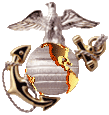
“America’s Battalion” captures 16 insurgents, 24 suspected insurgents, in Haditha Triad region of Iraq
By Multi-National Corps, Public Affairs Office, Camp Victory Sep 3, 2006
CAMP AL ASAD, Iraq – U.S. Marines detained 16 confirmed insurgents and 24 suspected insurgents yesterday throughout the Haditha Triad region in western Al Anbar Province, Iraq.
Marines from the Hawaii-based 3rd Battalion, 3rd Marine Regiment, known as “America’s Battalion,” captured the known and suspected insurgents during both routine and pre-planned counterinsurgency operations in the “Triad” region.
Some of the insurgents captured are known for intimidating the local populace, attacking Coalition and Iraqi forces, and providing logistical support to local insurgents. In one captured insurgent’s home, a Marine patrol discovered various materials used to construct improvised explosive devices (IEDs), an AK-47 assault rifle with multiple round cartridges and binoculars.
Furthermore, a U.S scout sniper team fired upon anti-Iraqi forces, which were firing upon a Marine M1A1 tank on a road in Haditha. Two of the insurgents were killed; one was critically wounded and medically evacuated to a U.S. military medical facility for treatment. This follows a day after a separate scout sniper engagement which resulted in one insurgent being killed while digging a hole in a spot where numerous IEDs have recently been discovered or detonated.
“The Battalion’s successes over the last several days are really the result of the anti-Iraqi forces conducting attacks out of desperation. They see the growing capability of the Iraqi Army and recent fielding of the Iraqi Police as the clear beginning to the end of their influence in the Triad,” said Lt. Col. Norm Cooling, commanding officer of 3rd Battalion, 3rd Marine Regiment.
The Haditha Triad is a region made up of three neighboring cities – Haditha, Barwanah and Haqlaniyah – with a combined population of about 70,000, nestled along the Euphrates River about 160 miles northwest of Baghdad.
Third Battalion, 3rd Marine Regiment, which is part of Regimental Combat Team 7, arrived in Iraq in March and has spent the past five-plus months providing security to the Haditha “Triad” region and mentoring Iraqi Security Forces.
RCT-7 is the U.S. military unit responsible for western Anbar Province, an area more than 30,000 square-miles in size which stretches from the Jordanian and Syrian borders hundreds of miles east to Hit, a city about 70 miles northwest of Ramadi.
Lance Cpl Ryan A. Miller, 19, of Pearland, Texas, died Sept.14 while conducting combat operations against enemy forces in Al Anbar province, Iraq.
He was assigned to 3rd Battalion, 3rd Marine Regiment, 3rd Marine Division, III Marine Expeditionary Force, Kaneohe Bay, Hawaii.
Marine Corps News
Operation Guardian Tiger IV brings Iraqi police to Haditha Triad Region for the first time in two years
Sept. 15, 2006 By Sgt. Roe F. Seigle
HADITHA TRIAD, Iraq (Sept. 15, 2006) -- Iraqi Police officers patrolled the Haditha Triad region’s windswept streets for the first time in more than two years thanks to an operation led by Marines here in August.
Marines of the Hawaii-based 3rd Battalion, 3rd Marine Regiment, known as “America’s Battalion,” partnered with Iraqi soldiers and police, captured more than 30 suspected insurgents in the operation dubbed “Guardian Tiger IV.”
The Iraqi Police also talked to hundreds of men who expressed interest in participating in future police recruitments in the region’s cities of Barwana, Haqlaniyah and Haditha, which are nestled along the Euphrates River about 130 miles northwest of Baghdad.
According to 1st Lt. Victor Lance, 26, officer-in-charge of the 3d Battalion Police Transition Team, a permanent police force will begin its implementation before year’s end. The Police Transition Team is responsible for training Iraqi police officers and assisting in recruiting police. They also screen candidates during the recruiting.
3rd Battalion is the unit responsible for training and mentoring Iraqi Security Forces along with providing security in this region.
“Everyone we talked to in the Triad region said they would be supportive of a police force and many asked about the pay and benefits,” said Lance. “We let the people know that the Iraqi police and the Marines would protect them from the insurgents.”
Many of the police officers who came from various regions in Northern Iraq had previously served as law enforcement officials in the Triad region, but fled when they were forced out by insurgents. Some came from neighboring towns, said Lance, a native of New Hope, Pa.
In the early stages of the operation, the police quickly spotted insurgents who were suspected of previous attacks on coalition and Iraqi Security Forces while patrolling the streets of the region. Temporary police stations were then established for an incoming police force, said Lance.
The police went house-to-house in the region spreading word of the upcoming police recruitment. Groups of 50 or more men often came up to the police and asked about pay and benefits. This is a very different story than it was last year, according to Marines here. Talking to or cooperating with Iraqi Security Forces was a sure death sentence from insurgents. Past recruitments in the Haditha Triad region showed minimal results because of this, said Lance.
The fact that residents in the Triad region are supporting the police and their recruiting efforts is a sign that the region is one step closer to turning over security operations to Iraqi Security Forces, vice Coalition Forces, said Lance.
“Many brave Iraqi men are willing to put their lives on the line by volunteering to join the Haditha Triad Police Force,” said Lance. “They are focused on ridding the Triad of terrorists and making it a safe place for the people in the region.”
Lance’s assessment seems to reflect the recent trend of Iraqi men stepping forward to protect their communities by joining the growing police force in western Al Anbar. Five hundred volunteers joined last month as a result of the most successful police recruiting drive to date, according to Maj. Lowell F. Rector, the Police Implementation Officer for Regimental Combat Team 7.
The 500 recruits are expected to boost western Al Anbar’s police force to 2,200 uniformed policemen.
Regimental Combat Team 7 is the unit responsible for training and recruiting Iraqi Security Forces in western Al Anbar — an area of more than 30,000 square miles in size.
During the past two months insurgents have made desperate attacks against ISF and Coalition Forces, but had minimal results, said Lt. Col. Norman L. Cooling, Commanding Officer of 3rd Battalion.
The Battalion’s successes during Operation Guardian Tiger IV resulted in desperate attacks conducted by anti-Iraqi forces, said Cooling, 42, a native of Baytown, Texas. “They see the growing capability of the Iraqi Army and recent fielding of the Iraqi Police as the clear beginning of the end to their influence in the Triad.”
Lance said with Iraqi police and soldiers working hand-in-hand, Coalition Forces will not be needed in the area.
“The bottom line here is that the insurgents’ days are surely numbered here in the Haditha Triad,” said Lance. “Soon, their own countrymen are going to be the ones holding them accountable for their crimes.”
Lt. Col. Mazher Hassan of the Baghdadi Police Force agrees with Lance that the insurgent’s days are numbered. Baghdadi is a neighboring city of the Haditha Triad and has a population of 30,000.
“We told the people that if they want security, they need to join the police force and work with us and not be afraid of the insurgents,” said Hassan. “The more men we have to volunteer to fight insurgents by becoming policemen, the less power the insurgents will have.”
The Marines from 3rd Battalion are in their last month of a seven-month deployment to Iraq and will be replaced by another Hawaii-based U.S. Marine battalion.
Marines assigned to the Camp Pendleton, Calif.-based 3rd Assault Amphibian Battalion talk to an Iraqi woman during a four-hour patrol through Dulab, Iraq, July 17, 2006. The Marines were manning an observation point in this region of western Al Anbar Province, Iraq, July 9, when a band of heavily-armed insurgents surrounded and attacked the post for the second time in a month. A pickup truck came to a stop on a road near the post. Several young men jumped out and opened fire on the Marines, said Staff Sgt. Andrew Messuri, a squad leader with C Company, 3rd AA Bn., and a native of Camby, Ore. The Marines returned fire with their rifles and a machine gun. After a 15-minute gunfight, the Marines eliminated six insurgents and later captured four. But the Marines aren’t alone in their fight against the insurgency – several Iraqi Police officers fresh out of the police academy in Baghdad arrived in Dulab to live and train with the Marines. The Marines, who have spent the past four months providing security in this region, are more than halfway done with their seven-month deployment. They’re scheduled to return to the U.S. in October, and will be replaced by another U.S. military unit. Photo by: Sgt. Roe F. Seigle
Marines assigned to the Camp Pendleton, Calif.-based 3rd Assault Amphibian Battalion exit a seven-ton troop carrier July 17, 2006, during a four-hour patrol of Dulab, Iraq. The Marines were manning an observation point in this region of western Al Anbar Province, Iraq, July 9, when a band of heavily-armed insurgents surrounded and attacked the post for the second time in a month. A pickup truck came to a stop on a road near the post. Several young men jumped out and opened fire on the Marines, said Staff Sgt. Andrew Messuri, a squad leader with Company C, 3rd AA Bn., and a native of Camby, Ore. The Marines returned fire with their rifles and a machine gun. After a 15-minute gunfight, the Marines eliminated six insurgents and later captured four. But the Marines aren’t alone in their fight against the insurgency – several Iraqi Police officers fresh out of the police academy in Baghdad arrived in Dulab to live and train with the Marines. The Marines, who have spent the past four months providing security in this region, are more than halfway done with their seven-month deployment. They’re scheduled to return to the U.S. in October, and will be replaced by another U.S. military unit. Photo by: Sgt. Roe F. Seigle
Iraqi Police officers walk through a palm tree grove located along the Euphrates River in Dulab, Iraq, July 17, 2006. The Marines were manning an observation point in this region of western Al Anbar Province, Iraq, July 9, when a band of heavily-armed insurgents surrounded and attacked the post for the second time in a month. A pickup truck came to a stop on a road near the post. Several young men jumped out and opened fire on the Marines, said Staff Sgt. Andrew Messuri, a squad leader with Company C, 3rd Assault Amphibian Bn., and a native of Camby, Ore. The Marines returned fire with their rifles and a machine gun. After a 15-minute gunfight, the Marines eliminated six insurgents and later captured four. But the Marines aren’t alone in their fight against the insurgency – several Iraqi Police officers fresh out of the police academy in Baghdad arrived in Dulab to live and train with the Marines. The Marines, who have spent the past four months providing security in this region, are more than halfway done with their seven-month deployment. They’re scheduled to return to the U.S. in October, and will be replaced by another U.S. military unit. Photo by: Sgt. Roe F. Seigle
New uniforms and equipment, such as pistols, handcuffs, police batons and police cars were recently issued to the Iraqi police in Baghdadi, Iraq. After 30 recent graduates from the Iraqi police academy came to Baghdadi, residents in this Saddam-era military housing complex there are expressing interest in joining the police force because they are noticing a decrease in insurgent activity. Marines with the Hawaii-based 3rd Battalion, 3rd Marine Regiment, are combating insurgency with the local police officers – who recently received “much needed” new gear to get the job done – pistols, protective vests, rifles and batons to use while patrolling the streets. Soon they will receive radios and police cars, said Maj. Eric Kelly, 36, the commanding officer of Weapons Company. Recently the police, along with Iraqi soldiers, captured 15 suspected insurgents for attacks against Coalition Forces. They also seized a cache of small-arms weapons in the city. Photo by: Sgt. Roe F. Seigle
An Iraqi police officer talks to local workers Aug. 12, 2006, in the city of Baghdadi, Iraq. New uniforms and equipment, such as pistols, handcuffs, batons and police cars were recently issued to the Iraqi Police in Baghdadi, Iraq. After 30 recent graduates from the Iraqi police academy came to Baghdadi, residents in this Saddam-era military housing complex there are expressing interest in joining the police force because they are noticing a decrease in insurgent activity. Marines with the Hawaii-based 3rd Battalion, 3rd Marine Regiment, are combating insurgency with the local police officers – who recently received “much needed” new gear to get the job done – pistols, protective vests, rifles and batons to use while patrolling the streets. Soon they will receive radios and police cars, said Maj. Eric Kelly, 36, the commanding officer of Weapons Company. Recently the police, along with Iraqi soldiers, captured 15 suspected insurgents for attacks against Coalition Forces. They also seized a cache of small-arms weapons in the city. Photo by: Sgt. Roe F. Seigle
An Iraqi police officer searches a man before entering a police compound in Baghdadi, Iraq, Aug. 12, 2006. New uniforms and equipment, such as pistols, handcuffs, batons and police cars were recently issued to the Iraqi Police in Baghdadi, Iraq. After 30 recent graduates from the Iraqi police academy came to Baghdadi, residents in this Saddam-era military housing complex there are expressing interest in joining the police force because they are noticing a decrease in insurgent activity. Marines with the Hawaii-based 3rd Battalion, 3rd Marine Regiment, are combating insurgency with the local police officers – who recently received “much needed” new gear to get the job done – pistols, protective vests, rifles and batons to use while patrolling the streets. Soon they will receive radios and police cars, said Maj. Eric Kelly, 36, the commanding officer of Weapons Company. Recently the police, along with Iraqi soldiers, captured 15 suspected insurgents for attacks against Coalition Forces. They also seized a cache of small-arms weapons in the city. Photo by: Sgt. Roe F. Seigle
Cpl. Yull Estrada Rodriguez, 21, of Alegre Lajas, Puerto Rico, died Sept. 20 while conducting combat operations against enemy forces in Al Anbar
province, Iraq.
He was assigned to the 3rd Battalion, 3rd Marine Regiment,
3rd Marine Division, III Marine Expeditionary Force, Kaneohe Bay, Hawaii.
OC Register
